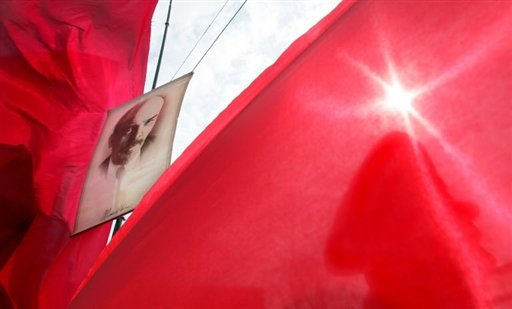Lenin falls from pedestal as Russia marks 140th birthday
Marina Lapenkova
MOSCOW, Marina Lapenkova - Russian Communists celebrated Lenin's 140th birthday on Thursday but the first Bolshevik leader is increasingly viewed as a dusty history-book figure while his successor Stalin still sparks controversy.
In 50 years' time "no one will remember Lenin except historians," 30 percent of Russians told the VTsIOM state polling agency in a survey published this week.

A picture of Vladimir Lenin is seen among red flags.
But almost two-thirds of those under 25 called themselves "indifferent" to Lenin in the VTsIOM poll.
Lenin, whose embalmed body still lies in the Lenin Mausoleum on Red Square, was glorified as a saint-like figure until the fall of the Soviet Union in 1991.
As part of indoctrination, nursery school children played under portraits of the curly-haired young Lenin and learned poems about "Uncle Lenin."
Later they were taught that the leader's dissected brain, studied at a Moscow research institute, showed clear signs of genius.
"It was perestroika that knocked Lenin off his pedestal," said political analyst Gleb Pavlovsky. "The new Russia did not want to trace its origins back to the 1917 Revolution and wanted to forget Lenin."
The Communist Party and its diehard supporters were Thursday feting the birthday with rallies across the country but support for Lenin has dwindled in the post-Soviet era.
Over the last two decades, the number of Russians who describe Lenin as a "the most important world figure" has fallen almost by half, from 72 to 34 percent, according to the Levada independent polling centre.
In a playful attack, a Lenin statue in the centre of Saint Petersburg had a hole blown through its rear on April Fool's Day in 2009. The culprits were never found although the statue has been restored.
Meanwhile Stalin is experiencing a post-Soviet wave of approval. Over the same period, the number of Russians who judge Stalin as the world's most important figure has tripled from 12 to 36 percent.
A survey carried out in December by the VTsIOM state polling agency found that 37 percent of Russians had "positive" feelings towards Stalin.
And Stalin still rouses passions across the generations.
A controversial plan by the Moscow city government to portray Stalin in posters for Victory Day on May 9 prompted both war veterans and university students to send open letters of protest to newspapers this week.
Stalin, who ruled the Soviet Union from Lenin's death in 1924 until his own death in 1953, "symbolizes the victories of the Soviet empire and seduces Russians more than Lenin," said Levada centre researcher Denis Volkov.
Stalin "is perceived as the stronger leader and the author of the Soviet victory over the Nazis in World War II, which for Russians is by far the most important event of the last century," Volkov said.
Analyst Valery Khomyakov of the Council on National Strategy argued that such a "distinction between the two tyrants is artificial," however.
"Lenin was the author of the Red Terror, who ordered mass executions and laid the foundations for Stalin's crimes," he said.
Khomyakov predicted that Stalin's strong-man image will be put to use in the next presidential election, in which some analysts expect Prime Minister Vladimir Putin to stand.
"During the run-up to the presidential election (predicted to take place in 2012), the supporters of Putin will once more cultivate the image of Stalin and the image of Lenin will fall into obscurity," Khomyakov predicted.
-----------------------------------------------------------------------